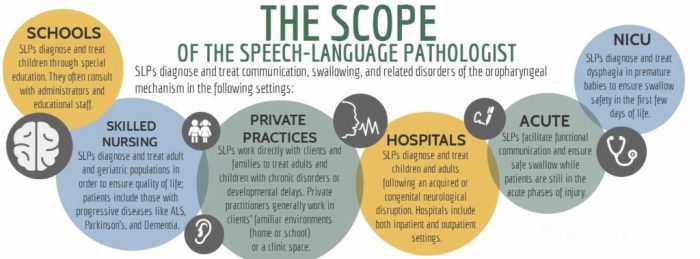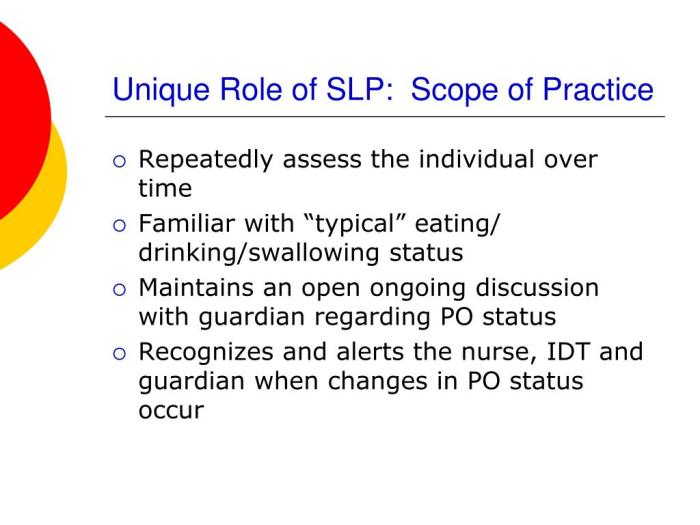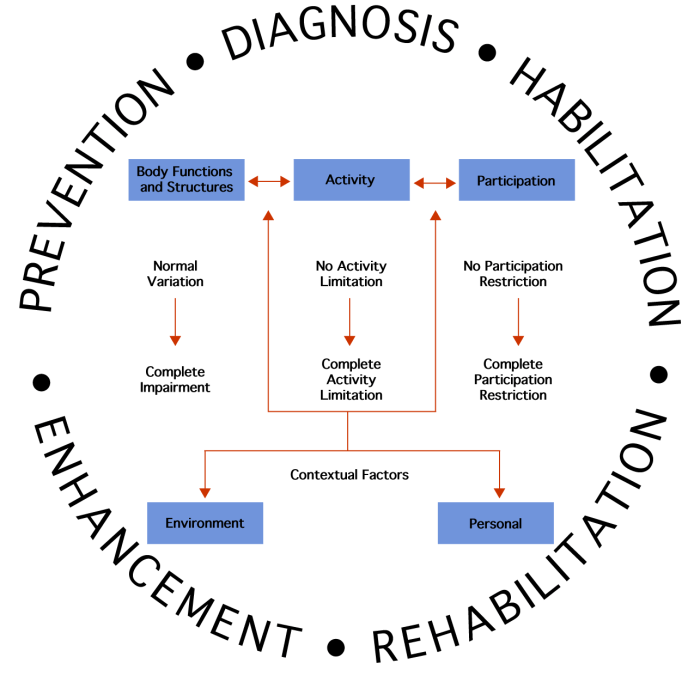The SLP Scope of Practice Handout is an indispensable resource for speech-language pathologists (SLPs), providing a clear and concise overview of their scope of practice. This guide delves into the ethical and legal implications of SLP practice, empowering SLPs to deliver safe and effective services within their defined scope.
The handout covers a wide range of topics, including the definition of scope of practice, key areas of practice, ethical guidelines, legal implications, and examples of activities that fall within the scope of practice for SLPs. It also discusses limitations and exceptions to the scope of practice, emphasizing the importance of recognizing limitations and seeking appropriate consultation when necessary.
Scope of Practice Definition
Understanding the scope of practice is essential for speech-language pathologists (SLPs) to ensure they are practicing within their area of expertise and providing appropriate care to their clients.
The scope of practice for SLPs is defined by their education, training, and experience. It encompasses the assessment, diagnosis, and treatment of communication and swallowing disorders in individuals of all ages. SLPs work with clients to improve their speech, language, cognitive, and swallowing abilities.
Importance of Understanding Scope of Practice
Understanding the scope of practice is important for several reasons:
- It ensures that SLPs are providing services that are within their area of expertise.
- It helps to protect clients from receiving inappropriate or harmful treatment.
- It helps to maintain the integrity of the profession.
Scope of Practice Boundaries
The scope of practice for SLPs is not static. It can change over time as new research and evidence emerge. However, there are some general boundaries that define the scope of practice for SLPs:
- SLPs are not licensed to practice medicine or prescribe medication.
- SLPs cannot diagnose or treat medical conditions.
- SLPs cannot perform surgery.
SLP Scope of Practice Handout Structure
To create a comprehensive and informative SLP scope of practice handout, it’s essential to organize the content in a clear and concise manner. The handout should be structured into distinct sections, each covering a key aspect of the SLP’s scope of practice.
The following sections are recommended for inclusion in the handout:
Key Areas of Practice
This section should provide an overview of the various areas of practice within the scope of speech-language pathology. It should include a description of the types of disorders and conditions that SLPs are qualified to assess and treat, as well as the specific interventions and techniques they use.
Ethical Guidelines
This section should Artikel the ethical principles and guidelines that SLPs must adhere to in their practice. It should include information on confidentiality, informed consent, and the SLP’s role in advocating for their clients.
Legal Implications
This section should provide an overview of the legal implications of SLP practice. It should include information on licensure requirements, malpractice insurance, and the SLP’s responsibilities under the law.
SLP Scope of Practice Components: Slp Scope Of Practice Handout

SLP scope of practice encompasses a range of components that define the professional activities and responsibilities of speech-language pathologists (SLPs). These components include assessment, diagnosis, and intervention, which are essential for addressing communication disorders and related conditions.
Assessment
Assessment involves the evaluation of an individual’s communication abilities, including speech, language, cognition, and swallowing. SLPs utilize a variety of assessment tools and techniques to gather information about an individual’s communication skills, identify areas of strengths and weaknesses, and determine the appropriate course of intervention.
Diagnosis
Based on the assessment findings, SLPs establish a diagnosis that identifies the nature and severity of the communication disorder. The diagnosis guides the development of an individualized intervention plan that is tailored to the specific needs of the individual.
Intervention
Intervention involves the implementation of evidence-based strategies and techniques to improve an individual’s communication abilities. SLPs provide direct therapy services to individuals with communication disorders, working on goals that may include improving speech clarity, enhancing language comprehension and expression, or developing alternative communication methods.
Interdisciplinary Collaboration
SLPs often collaborate with other professionals, such as physicians, psychologists, educators, and social workers, to provide comprehensive care for individuals with communication disorders. Interdisciplinary collaboration ensures that all aspects of an individual’s needs are addressed, promoting a holistic approach to treatment.
Ethical Considerations in SLP Scope of Practice

Ethical considerations are paramount in the practice of speech-language pathology (SLP). SLPs must adhere to a code of ethics that guides their professional conduct and ensures the well-being of clients.Ethical principles relevant to SLP practice include:
- Autonomy: Respecting the client’s right to make informed decisions about their care.
- Beneficence: Acting in the best interests of the client and prioritizing their well-being.
- Non-maleficence: Avoiding harm to the client and minimizing potential risks associated with assessment, diagnosis, and intervention.
- Justice: Ensuring fair and equitable access to SLP services for all clients, regardless of their background or circumstances.
- Confidentiality: Maintaining the privacy and confidentiality of client information, except in cases where disclosure is legally required or necessary to protect the client or others from harm.
Ethical implications arise at various stages of SLP practice:
Assessment
Ethical considerations in assessment include obtaining informed consent, ensuring the accuracy and validity of assessment tools, and interpreting results fairly and objectively. SLPs must be aware of the potential impact of their assessments on clients’ lives and ensure that the information gathered is used appropriately.
Diagnosis
Ethical considerations in diagnosis involve making accurate and evidence-based diagnoses that are in line with current best practices. SLPs must consider the client’s perspective, respect their cultural background, and avoid labeling or stigmatizing clients.
Intervention
Ethical considerations in intervention include providing evidence-based and appropriate treatment plans that are tailored to the client’s individual needs. SLPs must respect the client’s autonomy, involve them in decision-making, and obtain their consent for any intervention procedures.
Resolving Ethical Dilemmas
Ethical dilemmas arise when SLPs encounter situations where multiple ethical principles may conflict. To resolve ethical dilemmas, SLPs should consider the following steps:
- Identify the relevant ethical principles and the potential consequences of each action.
- Consult with colleagues, supervisors, or ethics committees to seek guidance and support.
- Consider the client’s values, preferences, and best interests.
- Document the decision-making process and the rationale for the chosen course of action.
By adhering to ethical principles and engaging in ethical decision-making, SLPs can ensure the provision of high-quality, client-centered care that respects the rights and well-being of their clients.
Legal Implications of SLP Scope of Practice

The legal framework surrounding SLP scope of practice ensures that speech-language pathologists (SLPs) adhere to specific boundaries in their practice. These boundaries are Artikeld by state and federal laws, regulations, and ethical guidelines.Practicing outside of scope can result in severe consequences, including legal action, loss of licensure, and damage to professional reputation.
To broaden your perspective on the slp scope of practice handout, check out this intriguing article in el mundo crossword . It offers valuable insights that complement the information provided in the handout, enhancing your understanding of this essential topic.
SLPs must be aware of their scope of practice and stay within its boundaries to avoid these potential risks.
Strategies for Staying Within Legal Boundaries:
-
-*Educate Yourself
Regularly review state and federal laws and regulations governing SLP scope of practice.
-*Consult with Colleagues
Seek guidance from experienced SLPs or legal professionals when unsure about the scope of your practice.
-*Document Your Practice
Maintain accurate records of your assessments, interventions, and patient interactions.
-*Refer When Necessary
If a patient’s needs fall outside of your scope of practice, refer them to an appropriate professional.
-*Stay Up-to-Date
Attend continuing education courses and workshops to stay abreast of changes in scope of practice.
Examples of SLP Scope of Practice Activities

Speech-language pathologists (SLPs) perform a wide range of activities within their scope of practice. These activities can be categorized into four main areas: assessment, diagnosis, intervention, and counseling.
The following table provides examples of activities that fall within the scope of practice for SLPs:
Assessment
- Conducting speech and language evaluations
- Administering standardized tests
- Observing communication skills in natural settings
Diagnosis
- Determining the nature and severity of speech and language disorders
- Making differential diagnoses
- Developing treatment plans
Intervention
- Providing speech and language therapy
- Implementing augmentative and alternative communication (AAC) systems
- Teaching compensatory strategies
Counseling
- Providing counseling to individuals with speech and language disorders and their families
- Educating clients about speech and language disorders
- Advocating for the rights of individuals with speech and language disorders
Limitations and Exceptions to SLP Scope of Practice
As with any profession, SLPs have limitations to their scope of practice. Recognizing these limitations is crucial for providing ethical and competent care.
SLPs should refer clients to other professionals when their needs fall outside the scope of SLP practice. This includes medical conditions, psychological disorders, or other areas where specialized expertise is required.
When Referral is Necessary, Slp scope of practice handout
- When the client presents with medical conditions that require medical intervention, such as neurological disorders or head injuries.
- When the client exhibits signs of psychological distress or mental health concerns that require evaluation and treatment by a psychologist or psychiatrist.
- When the client’s communication difficulties are primarily due to cognitive impairments or developmental delays, requiring assessment and intervention by a neuropsychologist or developmental specialist.
Resources for SLP Scope of Practice

Stay informed about the latest developments in SLP scope of practice with these valuable resources:
This comprehensive list includes websites, articles, and professional organizations dedicated to providing up-to-date information and guidance on SLP scope of practice issues.
Websites
- American Speech-Language-Hearing Association (ASHA) Scope of Practice Page : Official ASHA website providing detailed information on SLP scope of practice, including guidelines, ethical considerations, and legal implications.
- National Center for Biotechnology Information (NCBI) Article on SLP Scope of Practice : Research article discussing the evolution of SLP scope of practice and its implications for the profession.
- American Occupational Therapy Association (AOTA) SLP Scope of Practice Page : AOTA’s perspective on SLP scope of practice, including its relationship to occupational therapy.
Articles
- The Evolving Scope of Practice for Speech-Language Pathologists : Journal article exploring the changing landscape of SLP scope of practice and the need for ongoing professional development.
- Defining the Scope of Practice for SLPs : ASHA article providing a comprehensive overview of the scope of practice for speech-language pathologists.
- The Role of the SLP in Interdisciplinary Practice : AOTA article discussing the collaborative role of SLPs in healthcare settings.
Professional Organizations
- American Speech-Language-Hearing Association (ASHA) : The largest professional organization for SLPs, providing resources, continuing education, and advocacy on scope of practice issues.
- American Occupational Therapy Association (AOTA) : Professional organization representing occupational therapists, including SLPs, with resources on scope of practice and interdisciplinary collaboration.
- National Stuttering Association (NSA) : Organization dedicated to providing support and resources for individuals who stutter, including SLPs specializing in stuttering.
FAQ Insights
What is the definition of scope of practice for SLPs?
Scope of practice refers to the specific activities that a healthcare professional is legally authorized to perform based on their education, training, and licensure.
What are the key areas of practice for SLPs?
Key areas of practice for SLPs include assessment, diagnosis, and intervention for communication disorders, swallowing disorders, and cognitive-linguistic disorders.
What are the ethical considerations in SLP scope of practice?
Ethical considerations in SLP scope of practice include obtaining informed consent, maintaining confidentiality, and avoiding conflicts of interest.
What are the legal implications of SLP scope of practice?
Practicing outside of one’s scope of practice can have legal consequences, including fines, license suspension, or revocation.